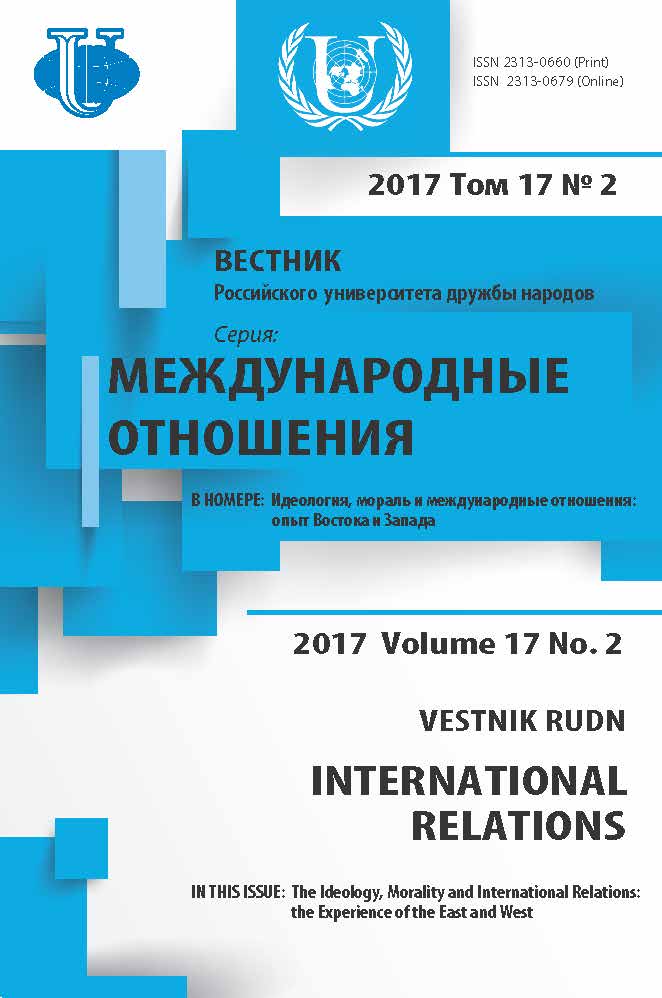Reparation a morale justice for Africa: the Benin (Nigeria) in perspective
- Authors: Idahosa S.O.1, Onimhawo J.A.2, Ikhidero S.I.2
-
Affiliations:
- Peoples’ Friendship University of Russia (RUDN University)
- Ambrose Alli University
- Issue: Vol 17, No 2 (2017): The Ideology, morality and international relations: the experience of the East and West
- Pages: 301-311
- Section: THEMATIC DOSSIER
- URL: https://journals.rudn.ru/international-relations/article/view/16065
- DOI: https://doi.org/10.22363/2313-0660-2017-17-2-301-311
- ID: 16065
Cite item
Full Text
Abstract
The paper offered a review of Africa’s moral call for reparation. It emphasized among other things that the continued underdevelopment and marginalization of the African continent today, is not unconnected with the trilogy of slavery, imperialism and colonialism. From the perspective of the British expedition of the Great Benin Kingdom in 1897, the paper highlighted how the African continent had been brutalized to strengthen the economies of their colonial overlords. The paper anchored its call for reparation on the premise that, reparation is not only recognized in international law, it has been paid to countries of the world whose dehumanizing experiences are not even as pathetic as those of Africa’s over 500 years of abject treatment, damages and destruction occasioned by slavery, imperialism and colonialism. It unveiled also the scholarly argument opposed to reparation. The work thus proposes that reparations from the western countries to Africa should be on cooperative and partnership basis. This should be in favour of development through deliberate international efforts in recompensing Africa for all the ills visited on her by the west.
Keywords
About the authors
Stephen Osaherumwen Idahosa
Peoples’ Friendship University of Russia (RUDN University)
Email: idahosa8@gmail.com
Moscow, Russia
John Afeagbokhai Onimhawo
Ambrose Alli University
Email: onims_j54@yahoo.com
Ekpoma, Nigeria
Solomon Ijeweimen Ikhidero
Ambrose Alli University
Email: solomonikhidero@yahoo.com
Ekpoma, Nigeria
References
- Brophy, A. L. (2006). Reconsidering Reparations. Indiana Law Journal, 81 (3), 812-849
- Brophy, A. L. (2004). The Cultural War over Reparations for Slavery. DePaul Law Review. 53 (3), 1181-1213
- Brownlie, I. (1979). Principles of International Law. London: Oxford University Press
- Btondi, M. (2003). The Rise of Reparation Movement. Radical History Review Journal, 87, 5-18. doi: 10.1215/01636545-2003-87-5
- Edionwe, O. A. (2010). Witness to Survival; Kingdom vs. Kingdom. Benin: Butterworth Productions Limited; 2010
- Hopkins, K. (2001). Forgive U.S. Our Debts? Righting the Wrongs of Slavery. Georgetown Law Journal, 89 (8), 2531-2556
- Horowitz, D. (2001). Ten Reasons Why Reparations for Slavery is a Bad Idea for Blacks - and Racist Too. Journal of Black Studies and Research, 31 (2), 48. doi: 10.1080/00064246.2001.11431145
- Ikhidero, S. I. (2014). The Matrimonial Oath of Fidelity among the Benin of Southern Nigeria: Its Ethical Implications for Postcolonial Nigeria. Germany: Lap Lambert Academic Publishing
- Loury, G. C. (2001). Little to Gain, Much to Lose. Black Issues in Higher Education, 18 (19), 42
- Michelson, M. R. (2002). The Black Reparation Movement: Public Opinion and Congressional Policy Making. The Journal of Black Studies, 32 (5), 574-587
- Okediji, M. (1998). On Reparations Exodus and Embodiment. African Arts, 31 (2), 8-10
- Osabu-Kle, D. T. (2000). The African Reparation Cry: Rationale, Estimate, Prospects, and Strategies. Journal of Black Studies, 30 (3), 1-15
- Plakensteiner, B. (2016). Benin: Kings and Rituals-Court Arts from Nigeria. Snoeck Publishers. URL: http://artwriteups.blogspot.com.ng/2010/08/benin-1897com-art-and-restitution_02.html (accessed: 20.02.2016)
Supplementary files










